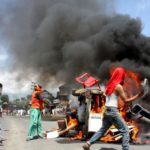 In 55 days 49 civilians have died in Jammu and Kashmir (J&K) with no sings of public protests waning any time soon. Despite all efforts of the State administration to impose curfew, the people continue to challenge the writ of the Government. A lull after the first round of protests was deceptive and public violence seems to have renewed with greater vigor. The mobs are attacking police stations, ambulances and railway stations. The State and Federal authorities continue to view the situation as a law and order problem while the protestors claim to be exercising their democratic right of protest against official policies; protests that have taken an ugly turn. On August 7, a nine year old boy died during the protests, the youngest causality of the on-going protests. According to the police the boy died in a stampede while the locals maintain that he was beaten to death by the police.
In 55 days 49 civilians have died in Jammu and Kashmir (J&K) with no sings of public protests waning any time soon. Despite all efforts of the State administration to impose curfew, the people continue to challenge the writ of the Government. A lull after the first round of protests was deceptive and public violence seems to have renewed with greater vigor. The mobs are attacking police stations, ambulances and railway stations. The State and Federal authorities continue to view the situation as a law and order problem while the protestors claim to be exercising their democratic right of protest against official policies; protests that have taken an ugly turn. On August 7, a nine year old boy died during the protests, the youngest causality of the on-going protests. According to the police the boy died in a stampede while the locals maintain that he was beaten to death by the police.
[Photo Courtesy: The Hindu]
The issue of greatest concern, accepted by Chief Minister Omar Abdullah in his recent press conference, is the fact that the people are leaderless. This adds to the spontaneity and uncertainty of the public protests. The situation is too complex to allow application of any standard remedy; the Government of India will have to devise imaginative solutions to restore peace. Chief Minister Abdullah and Home Minister P. Chidambaram have expressed the Government’s willingness to discuss ‘political remedies’ for addressing the public grievances but consider cessation of popular protests as an essential pre-condition for the political process to move ahead. The people, fatigued by promises of dialogue and resolution, refuse to be convinced by political statements. Army officers and jawans charge-sheeted by the Central Bureau of Investigation for the murder of five innocent civilians at Pathribal in Kashmir in 2000 have still not been prosecuted. To add insult to injury, official apathy has led to another round of fake encounters in Machhil in Kupwara earlier this year. Given this backdrop it is unlikely that the people of J&K will take official statements at face value and restrain their protests.
The argument that the people are instigated by the separatists to chant slogans of ‘azaadi’ (freedom) is running out of steam. Syed Ali Shah Geelani, leader of the separatist Hurriyat faction, had appealed to the people to give up violence and make push their demands through peaceful protests. Pakistan-based leader of the United Jihad Council and Hizbul Mujahideen chief, Syed Salahuddin, suggested to protesters that they adopt a more flexible approach, go slow on hartals (shutdowns) and allow people to buy food and let children study, effigies of him were burnt in Sopore, an Islamist stronghold and Hizbul Mujahideen bastion. “Who is he to tell us this? Sitting in PoK [Pakistan-occupied Kashmir], eating chicken supplied by Pakistani agencies, how can he feel our pain, anger and helplessness?” said Abdul Bhat, a friend of the 17-year-old who was killed by a police teargas shell. Statements and requests from all quarters, whether it is C.M. Abdullah or leaders like Geelani and Salahuddin no longer find favor with the people of Kashmir.
‘Azaadi’ is fast translating into desire for freedom from serving as pawns larger political and strategic game of international politics. The only option for the Indian Government is to stop perpetually treating the people of J&K as residents of a war zone. By its own admission the Indian Government has accepted that militancy in the State has reduced in the recent past and the valley was returning to normalcy. It is essential to translate this admittance from official statistics to actual governance. For the common people continuation of Armed Forces Special Powers Act makes no sense. The argument that withdrawal of AFSPA could result in increased militancy is highly cynical. Today the Government of India faces its greatest crisis of credibility in J&K. Before making future promises (most of which cannot be delivered) the Government will have to honestly review past policies. Siddharth Varadarajan is right in suggesting that Prime Minister Manmohan Singh must take bold steps to demonstrate his willingness to address the grievances of ordinary Kashmiris. He should not insult their sentiments by talking of economic packages, roundtable conferences and all-party talks. He should unreservedly express regret for the deaths that have occurred these past few weeks. He should admit, in frankness and humility, the Indian state’s failure to deliver justice all these years. And he should ask the people of Kashmir for a chance to make amends.
The people of J&K have already expressed faith in the Indian political system by participating in democratic elections. It is time to introspect why stones have replaced ballots. Is it because the people are instigated by militants or does it represent the failure of political leadership?